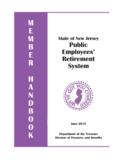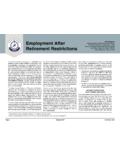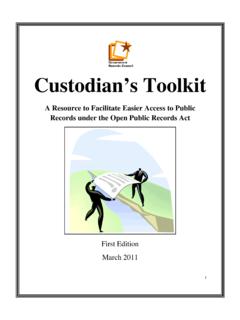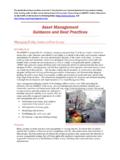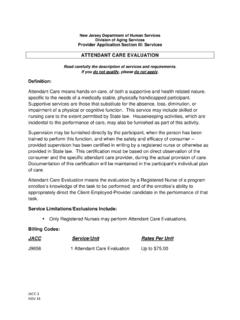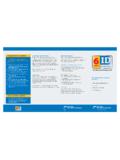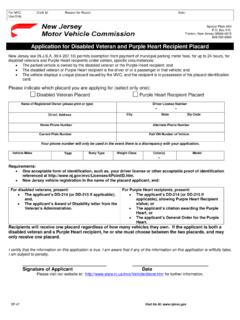Transcription of Retiring in New Jersey - Government of New Jersey
1 New Jersey Income Tax Guide Retiring in New Jersey (Updated April 2022) 2 Contents retirement Income In New Jersey .. 3 Pay Tax Throughout the Year .. 3 Withholding Tax from a Pension .. 3 Withholding Tax from an IRA .. 3 Making Estimated Tax Payments .. 3 Coronavirus-Related Distributions .. 3 Social Security, Railroad retirement , and Disability Benefits .. 3 Rollovers .. 4 retirement Income Loan .. 4 Military Personnel & Veterans .. 4 Military Pensions or Survivor Benefits .. 4 Veteran Exemption .. 4 Pensions and Annuities .. 4 Nonresidents .. 4 Taxable vs. Excludable 5 Noncontributory Plan .. 5 Contributory Plan .. 5 Individual retirement Account (IRA) Withdrawals .. 5 Contributions .. 5 Earnings .. 5 Roth IRAs .. 5 New Jersey Bonds .. 5 401(k) Plans .. 6 Section 457 plans (Deferred Compensation) .. 6 Pension Exclusion, Unused Exclusion, and Special Exclusion.
2 6 Qualified Domestic Relations Order (QDRO) Savings Plan .. 8 Beneficiaries of a Pension, Annuity, or IRA .. 8 Post- retirement Employment/Income .. 8 Life Insurance .. 8 Property Tax Relief .. 9 Senior Freeze .. 9 Homestead Benefit .. 9 Maintain Good Records .. 9 Connect With Us .. 9 3 retirement Income In New Jersey New Jersey taxes retirement income differently than the federal Government . If you are retired or planning to retire, this guide answers common questions regarding retirement income and how to report it on your New Jersey Income Tax return. It also can help prepare you for future tax situations. Pay Tax Throughout the Year Withholding Tax from a Pension New Jersey residents who receive pension or annuity income should consider asking their fund manager to withhold New Jersey Income Tax from those payments. The reason to withhold some money to cover taxes is because if you owe us too much tax, we might require you to make estimated payments every three months the following tax year.
3 If you want New Jersey Income Tax withheld from a pension, complete Form NJ-W-4P, Certificate of Voluntary Withholding of New Jersey Gross Income Tax from Pension and Annuity Payments. Indicate the amount of tax to be withheld ($10 minimum) and give the certificate to the payer of the pension or annuity. Withholding Tax from an IRA If you have an IRA, you might want to consider withholding New Jersey Income Tax when you receive an annual distribution, so you do not have to make estimated payments every quarter in subsequent years. Making Estimated Tax Payments You are required to make quarterly estimated tax payments to New Jersey if you owe more than $400 after taking all exemptions, deductions, withholdings, and other credits on your State return. Use Form NJ-1040-ES to file estimated tax payments when due. (See Estimating Income Taxes.)
4 Figuring out how much tax to withhold from a pension payment can be challenging. Consult our supplemental tax tables to get an idea of the withholding amount to indicate on your NJ-W-4P. For better accuracy, you will need to know: The frequency of payment weekly, bi-weekly, etc.; How much your payments are; How many exemptions you expect to claim. Coronavirus-Related Distributions New Jersey follows federal guidelines and timeframes for qualified rollovers. We will recognize a CRD as a tax-free rollover when the repayment of the CRD qualifies as a tax-free rollover for federal tax purposes. More information. Social Security, Railroad retirement , and Disability Benefits Social Security and Railroad retirement benefits are not taxable under the New Jersey Income Tax and should not be reported as income on your State return.
5 4 Payments from a public or private pension plan because of total and permanent disability also are not taxable. However, if you retired before age 65 on a permanent disability pension and continue to receive payments after 65, the disability pension is treated as an ordinary pension beginning at that age and is taxable. Rollovers If you take a distribution that qualifies for federal income tax deferral, it also qualifies for New Jersey Income Tax deferral. Do not report qualified rollovers. However, tax-deferred distributions are taxable contributions upon withdrawal. (For more information about any deferrals written under the CARES Act, see Coronavirus-related distribution.) retirement Income Loan A pension loan from a retirement plan is a loan that is not reportable as income.
6 Military Personnel & Veterans Military Pensions or Survivor Benefits New Jersey does not tax military pensions or survivor s benefits, regardless of your age or disability status. Do not include such payments on your New Jersey return. This exemption does not apply to civil service pensions or annuities, even if the pension or annuity is based on credit for military service. They are taxable. (See Military Personnel and Families.) Veteran Exemption Many veterans qualify for an additional $6,000 exemption on their New Jersey Income Tax. If you are an honorably discharged military veteran, you are eligible for this exemption. The first time you claim the exemption, you must provide official documentation showing you were honorably discharged or released under honorable circumstances from active duty. (See Military Personnel and Families.)
7 Pensions and Annuities Pension and annuity income are taxable and must be reported on your New Jersey Income Tax return. In some cases, the taxable pension or annuity amount that you report on your New Jersey return may differ from the amount reported on your federal return. That is because you may have to use a different method to calculate the taxable amount for your New Jersey return than the method used for federal income tax purposes. (See retirement Income.) Nonresidents Pension and annuity income received by a nonresident for work performed in New Jersey are not taxable, even if you were a resident when you worked in New Jersey . However, you might have other income from 5 New Jersey that is taxable to a nonresident ( , wages, business income, or a gain from selling real property such as real estate in New Jersey ).
8 If so, you are required to file a New Jersey Nonresident Income Tax return (Form NJ-1040NR) and report any pension or annuity income in Column A along with your other taxable income. Taxable vs. Excludable Distributions Pensions and annuities fall into one of two categories: noncontributory or contributory. The taxable amount you report on your New Jersey Income Tax return will depend on whether the pension or annuity payment came from a contributory or a noncontributory retirement plan. Noncontributory Plan You have a noncontributory plan if you did not make contributions to that plan. Distributions from a noncontributory plan are taxable. Include the full amount on your tax return. Contributory Plan You have a contributory plan if you made contributions to that plan. In general, your contributions were already taxed since they were made through payroll deductions.
9 Therefore, contributions are excludable from tax. When you receive a pension or annuity distribution from a contributory plan, you must determine the taxable and excludable portions so you are not taxed twice on your contributions. Individual retirement Account (IRA) Withdrawals You must calculate the taxable and excludable portions of the withdrawal for your New Jersey tax return. (See retirement Income for information on how to calculate taxable and excludable portions.) Contributions Money added to your IRA is referred to as your contributions. In general, IRA contributions were taxed when you made them and are not taxed by New Jersey when withdrawn. However, amounts rolled over into your IRA from tax-deferred pension plans that qualify for federal tax deferral are taxable upon withdrawal, since the money was never previously taxed.
10 Earnings Interest, dividends, and capital appreciation ( , an increase in the value of the investments you bought) are taxable upon withdrawal. Roth IRAs Roth IRA contributions were taxed when you made them. For more information on the taxability of Roth IRA distributions, see our Technical Bulletin Roth IRAs. New Jersey Bonds An IRA withdrawal is not taxable if the distribution you receive was derived entirely from New Jersey municipal, county, or State debt (bonds) that is exempt from New Jersey Income Tax. (For more information, see Exempt Obligations.) 6 401(k) Plans Contributions that employees make to 401(k) plans from their wages are not taxable as of January 1, 1984. 401(k) distributions, including contributions made on or after January 1, 1984, are fully taxable since the contributions were not taxed when made, and earnings are taxable.
